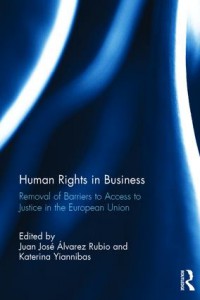International Protection of Human Rights and Activities of Transnational Corporations
Prof. Dr.Dr. Fabrizio Marrella has just published his course entitled “Protection internationale des droits de l’homme et activités des sociétés transnationales/International Protection of Human Rights and Activities of Transnational Corporations”, delivered at The Hague Academy of International Law in 2013, as vol. 385, 2016, of the Recueil des cours/Collected Courses (RCADI).
Here is a short abstract:
Since the 1960’s the regulation of multinational corporations has become a hot topic in the international agenda. Fifty years later, the negative (or positive) impact of transnational corporations activities on human rights has steadily increased. Economic globalization has largely involved the activities of transnational corporations and such a trend has even been powered by Nation States. Since the end of the Second World War, Governments have liberalised trade and investment flows and more recently, to cut public deficits, they have started the decentralization, outsourcing and privatization of certain classic functions of the State. International Human Rights Law is based on an inter-State matrix where international responsibilities are imposed on Nation-States, not directly on corporations. Therefore, forum shopping and law shopping strategies have been used by some transnational corporations in order to hide behind State sovereignty while benefiting from dogmas of Public International Law denying any international responsibility for them.
In 2011, the UN Human Rights Council unanimously adopted the UN Guiding Principles on Business and Human Rights (UNGPs), which is the first global standard for preventing and addressing the risks of adverse impacts on human rights linked to business activities. The UNGPs encompass three pillars outlining how states and businesses should implement the framework: 1) The state duty to protect human rights; 2) The corporate responsibility to respect human rights and 3) Access to remedy for victims of business-related abuses.
Such a framework clearly identifies different roles and “responsibilities” but does not differentiate situations of “accountability” from those of “legal responsibility”. It makes Corporate Social Responsibility operative through the obligation of “due diligence” and impact evaluations to identify and remedy adverse effects.
All that has implications both for public international law and for private international law. Private international law analysis, in particular, becomes crucial to explore, as it is done in the second part of the course, the legal meaning of the implementation of the third pillar of the UNGPs, i.e. on access to remedies for victims of violations of human rights committed in the context of business activities. If remedies precede rights, it is regrettable that the third pillar turns out to be the weakest one as compared to the other two. Indeed, it becomes evident that the proliferation of international treaties of protection of human rights, international acts, supervisory bodies, laws, initiatives of RSE or doctrinal studies, risk to remain just different forms of political dialogue if they have no effective legal use for victims on the ground.
Further information, including a table of contents and some extracts, is available on the publisher website.
 Just published by Routledge, the book Human Rights in Business: Removal of Barriers to Access to Justice in the European Union presensts the final results of the
Just published by Routledge, the book Human Rights in Business: Removal of Barriers to Access to Justice in the European Union presensts the final results of the